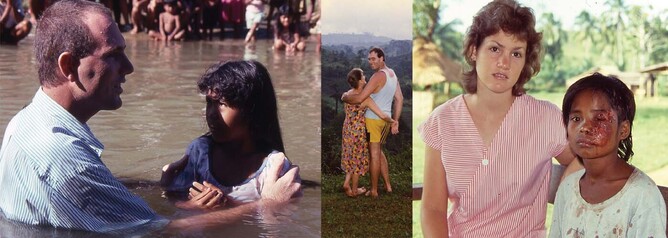Missionaries go to foreign fields to serve — but are we prepared for the fact that servants can’t choose the job they want, are often in uncomfortable situations, are often over-tired and often feel unappreciated? And emotionally…well, as a servant, you can either let yourself grow ‘numb’ or ‘desensitized’ in order to ‘cope’, or you can let yourself ‘feel’ and ‘sensitize’ which can be painful but also very freeing.
One of our big servant roles on the mission field over the past 30 years has been medical work, and it started only three weeks after we had moved into a remote village. We had no idea back then what we were doing (we were 23 and 26 years old), but armed with a book aptly named ‘Where there is no Doctor’, and flooded with desperate people who brought their sick from far and wide, we soon learned to do things we’d never dreamed we’d be doing — and we both loved doing it. Paul would joke with the sick about where he was going to amputate their leg when he was really just going to give them chloroquine for their malaria. I got to deliver babies, comfort and help mothers with sick children, teach Mother’s Classes — and I was in my element! Once during a terrible measles epidemic, we worked day and night for about a month with very little sleep, caring for and treating almost 100 children. In the past, whole villages of children would be wiped out by this disease, but with proper care we saw every child during this epidemic recover, except for one poor baby whose parents went back to the witch-doctor.
But the years went by and things got more complicated. People’s expectations get higher, precedents are set, and missionary servants get assigned a role. I remember being out at an over-crowded, third world hospital, with my toddler on my hip, sweat running down my back, feeling faint from the heat. With us were 17 patients that we had brought out to town because they had conditions that could not be treated at our remote clinic: three with fistulas, one going blind, five with suspected tuberculosis needing xrays, and the list went on. And as I juggled caring for my toddler and getting each patient to the right place in the hospital one by one, my nearly blind patient was waving her patient ID card at me and kept saying, “Sa kanak bie, sa kanak!” (What about mine, what about mine!) Back in those years, we rarely got to town because the road was so bad and the trip so difficult, and I just wanted to take my little son to the pool at the hotel and to McDonalds, but instead we spent most of our week out at this hospital, slugging through the heat and the ‘kanak bie’s until the last one was all cared for.
That was years ago, and our toddler is a grown man now. The funny thing is that I just saw the ‘kanak bie’ lady (who didn’t end up going blind) two weeks ago at our Tinaytayan church, and do you know what she said to me? She didn’t say, “Thank you Deb for helping me all those years ago — I can still see today.” Instead she said, “Do you have any of those eye drops you gave me? I need some more.”
The servant role – there’s not much thanks in it, and there’s a lot of expectations that can really burden you down when you multiply it by the hundreds.
I said above ‘can really burden you down’ — but it doesn’t have to. Our Lord Jesus Himself said, “Take My yoke upon you and learn from Me, for I am gentle and lowly in heart and you will find rest for your souls. For My yoke is easy and My burden is light.” He also said, “I came not to be served but to serve.”
We moved into one of the hardest ministries we’ve ever been in at a time when I was very vulnerable. I was the mother of a toddler and so was often very tired. I didn’t like the place where we were living and I often felt fear squeezing my chest in its tight grasp because of the warring culture of the people group we lived amongst, and their frequent clashes with each other and the revenge killings. I ‘coped’ with the shocking killings and mutilations happening around us by becoming ‘numb’ to it and got used to it as a way of life.
Even though we were under the extremely stressful workload of church planting in a new area, setting up a cross-cultural missionary team of Aussies working with local missionaries, translating the New Testament, setting up a clinic, doing community development, and working with our international mission organization in a leadership role, we ‘coped’ by soldiering on, denying ourselves and telling ourselves we could always go up another gear.
It was actually exhilarating sometimes to be involved in so many facets of ministry and to see things moving ahead so fast through the amazing work that God was doing. But a work like this brings a lot of unforeseen stresses along with it. Some of the stresses we faced were things like being misunderstood by the older missionaries, dangers lurking around our home at night (sometimes in the form of armed men out in the shadows), death-threats, and losing some of the local church leaders when they fell into sin (this was one of the worse stresses and always left us feeling very depressed).
Looking back on those early years I feel like I went through some of that time in a bit of a daze, trying not to let myself ‘feel’ too much or I might start crying my eyes out and not be able to stop. I struggled with our Lord’s words that His burden was light, because to me the darkness of that place, and the sicknesses and the sadness of the lost around us, felt too heavy to bear.
But by patiently teaching me over the years, the Lord has been easing me into His yoke and it truly is an easy one and His burden truly is light. More and more we are enjoying our servant roles. Being a servant — even to the demanding ‘masters’ — is one of the greatest joys we can have on this earth, and the long working hours, the lack of thanks, and doing uncomfortable jobs is just the normal lot of a servant, and we have learnt to accept this and not to be surprised.
The surprise factor is actually one of the big trials to which we had to adjust. Missionaries arrive on the field with expectations — well, actually I am just speaking for us — but I suspect it may be a common factor. We arrived on the field thinking that the people to whom we came to minister would be eager to hear the Word, that they would want us to be there and accept us as their friends — but it was not so. We were taken by surprise, felt let down, and things just weren’t what we expected, and at times we found ourselves asking each other, “Is this job even ‘doable’?”
Doesn’t the Scripture say, “God looks down from heaven on the children of man to see if there are any who understand, who seek after God…no one understands; no one seeks for God…” (Psalm 53:1-3; Romans 3:10-12)?
In our new village we had no friends, no co-workers, no running water, no bathroom — just exhausting heat. There was no place to cook except a smoky, fireplace on a bed of ash with three rocks to set the pot on. We ate rice and dried fish and canned fish and frogs and sweet potato. Not long into our miserable days I thought that as their new missionary, I should start making friends with all the ladies in the village, visit them in their homes, learn all their children’s names, and let them get to know me. Paul was busy most of the day dealing with the huge trials of trying to get an airstrip and a small home (with a bathroom!) built — an almost impossible task considering that there was no road access, no power tools and no hardware store.
As I approached the first house where just a few minutes earlier I’d seen a young mother and her two young children, I called out ‘Ayo’ — the equivalent of ‘Hi, is anyone home?’ To my dismay the open front door was suddenly slammed shut and there was not a murmur of acknowledgment to my call. I was left awkwardly standing outside listening to the rustle and whispering inside and wondering how to respond. That awkward feeling of not being accepted, of not being liked and certainly not being welcome in their homes and lives, happened many times over in the early months and to some extent over the next few years.
Getting through the first five years on the field is a critical time. You don’t really understand the culture — even after a couple of years, you can’t really speak the language. Even after a couple of years of language study, the frequent feeling of ‘floundering’ takes a big toll on your emotions. In those early days, it took Paul and I one whole week to prepare one Bible lesson and to translate a few Bible verses. After teaching the lesson, Paul would be drenched with a sweat caused not just by the intense heat but also by the intense focus it took to try and teach the Word in a language not his own.
Paul had a good way of coping: when it just got too much, he had a sleep. After a couple of hours’ nap, he could look at things in a different light. Sometimes that’s all it took. But sometimes it took a lot of deep conversations together, trying to work through our emotional messes. We did not come through these past 30+ years unscathed emotionally, but I think we’ve avoided becoming desensitized, and we’re growing softer and more tender — especially to the Lord’s voice and also to the feelings of those around us.
In those early days as we struggled with rejection and many other troubles, God helped us to understand that natural man does not seek God, and that in time God would do a work, and our part was to stay there and to keep focussed on Him. In time God DID achieve all that He had promised! When His Word is preached, it does not go out without taking effect. We found that His Word was not only our refuge, but it was the living sword, the light, the power of God for salvation. He accomplished all that He planned in all the places He took us through His Word!
By Deb Howells


